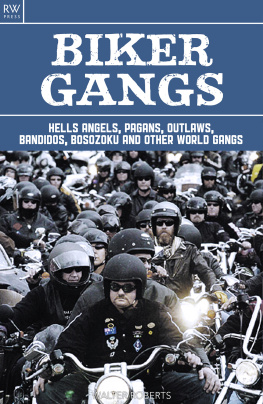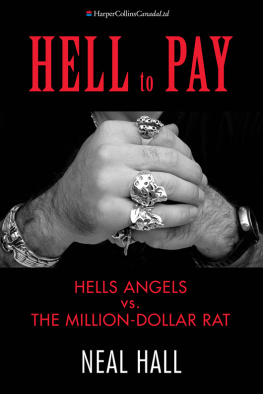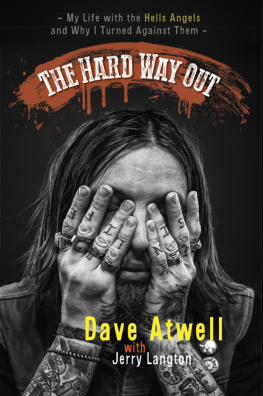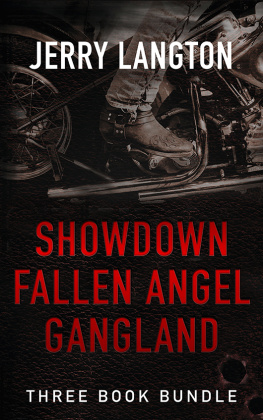The Biker Trials
The Biker Trials
Bringing Down the Hells Angels
PAUL CHERRY

Copyright Paul Cherry, 2005
Published by ECW PRESS
2120 Queen Street East, Suite , Toronto, Ontario, Canada M4E IE2
All rights reserved. No part of this publication may be reproduced, stored in a retrieval system, or transmitted in any form by any process electronic, mechanical, photocopying, recording, or otherwise without the prior written permission of the copyright owners and ECW PRESS.
LIBRARY AND ARCHIVES CANADA CATALOGUING IN PUBLICATION
Cherry, Paul, 1968
The biker trials : bringing down the Hell Angels / Paul Cherry.
ISBN 1-55022-638-x
. Hells Angels.. Trials (Narcotic laws) Qubec (Province) Montral.. Drug traffic Qubec (Province).. Motorcycle gangs Qubec (Province).. Organized crime Qubec (Province). I . Title.
HV6491.C32Q4 2005A 345.71277971428 C2005-904372-5
Editor: Emily Schultz
Production: Mary Bowness
Cover Photo: Photonica
Printing: Transcontinental
This book is set in Minion and Scratch
With the publication of The Biker Trials ECW PRESS acknowledges the generous financial support of the Government of Canada through the Book Publishing Industry Development Program ( BPIDP ), the Canada Council for the Arts, and the Ontario Arts Council, for our publishing activities.

DISTRIBUTION
CANADA : Jaguar Book Group, Armstrong Ave., Georgetown, ON L7G 5S4 UNITED STATES : Independent Publishers Group, 814 North Franklin Street, Chicago, IL , USA 60610
PRINTED AND BOUND IN CANADA

To S and C
Table of Contents
Acknowledgements
Seeing as how this book is about crime and the courts it is fitting that this begin with a confession. I was not able to attend all of the court procedures covered in this book. The three main trials mentioned in this book stretched out over a period of months and in one case more than a year, all while I covered crime on a daily basis for The Gazette. Writing about some key parts required a thorough listening of digital recordings after the hearings took place.
Keeping informed of what was significant and interesting would not have been possible without help from several people, including the journalists who followed the trials on a daily basis like Isabelle Richer of Radio Canada, Marc Pigeon of the Journal de Montral, Charles Andr Marchand and especially Andr Cdilot of La Presse who, along with Michel Auger of the Journal de Montral, gave much support through their encouragement.
Writing this also would never have been possible without the support of author Lee Lamothe. Antonio Nicaso, author of several books on organized crime, also lent support through his advice.
I also want to thank everyone at ECW Press who helped, especially Jack David, David Caron, Mary Bowness, Crissy Boylan, Emily Schultz and Emma McKay.
It goes without saying that writing a book requires time and I wouldnt have had that valuable commodity without Ross Teague and George Kalogerakis, the current and former city editors at The Gazette, who both juggled complicated schedules while allowing me to dedicate time towards this book.
The other valuable commodity that was always in supply while writing this was advice and information and for this I would like to thank Guy Ouellette, a retired Sret de Qubec sergeant and the provinces foremost expert on biker gangs, Gary Francoeur, Rita Legault of the Sherbrooke Record, Peter Edwards of the Toronto Star and Adrian Humphries at the National Post.
Researching this material required the patient help of many clerks at courthouses across Quebec.
There are several other people I would like to thank including several friends and family members who would rather not see their names appear in such a book.
Introduction
Not Garbagemen
Most disputes over criminal matters like drug turf appear nebulous to the average, law-abiding citizen. Who were the people behind this explosion? or What could have motivated someone to gun down that young man on my street? are questions often left hanging as two criminal organizations battle it out in a metropolitan area like Montreal. It took a while, but eventually the war between the Hells Angels and a group of criminal organizations called the Alliance, which started in 1994, held little mystery for the average person.
By August 1995, after a series of explosions and murders, and in particular the death of an innocent boy, many people in Quebec were aware of what the war was about and who the two sides were. Unlike most shadowy criminal organizations the Hells Angels and a rival gang called the Rock Machine advertised who they were with patches on the backs of their leather jackets. Like politicians or corporations eager to generate name recognition, both sides handed out T-shirts and baseball caps to drug dealers who sided with them.
Operation Springtime 2001 signaled the beginning of the end of what came to be known as the biker gang war. On March 28, 2001, more than 2,000 police officers across Quebec were dispatched to carry out more than 130 arrest warrants and seize gang assets, including 20 buildings, 70 firearms and $8.6 million Canadian and $2.7 million U.S.
The massive police roundup was the result of two police investigations, Project Rush and Project Ocean. Project Rush was put together using what was, at that point, recently adopted federal anti-gang legislation. Investigators and prosecutors built a case geared toward charging gang members with the murder of their rivals, even if they had a limited role the gangs affairs.
The primary target of Project Rush was the Hells Angels whose members were the leaders in the war. The lengthy police investigation involved years of gathering evidence like wiretaps, countless hours of police surveillance and working informants. It began in 1998 with the police zeroing in on people who were members of the Montreal-based organization and its underling gang, the Rockers. For the latter part of the investigation the officers involved were part of Regional Integrated Squad, which grouped together Montreal-area investigators from the RCMP, La Sret du Qubec and the Montreal Urban Community police. The squad was based on an earlier model called the Wolverine Squad, an elite investigation unit focusing on the biker gang war.
Project Rush spawned another investigation, Project Ocean, during which the police learned how incredibly organized the Hells Angels had become. It was through Project Ocean that police discovered how the gang managed its drug money. Though Project Ocean was an almost accidental offshoot of Project Rush, it produced evidence that led to the arrests of more Hells Angels than any other police operation in Canada in more than a decade.
The end result of these investigations was dubbed Operation Springtime 2001. It created a brief void in Montreals drug trade that year. But the gangsters who were part of the battered and bruised Alliance would regroup and join the Bandidos, an international biker gang similar to the Hells Angels. Sporting new patches, the Bandidos would mount an effort to take over the drug turf abandoned by the jailed Hells Angels. These efforts would be short-lived since anyone in Quebec associated with the Bandidos was arrested on June 1, 2002, in Operation Amigo. This police investigation produced 62 arrest warrants and resulted in charges of drug trafficking and conspiracy to commit murder.
Next page










